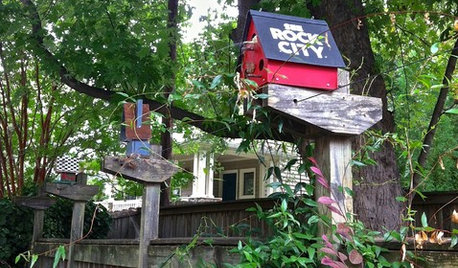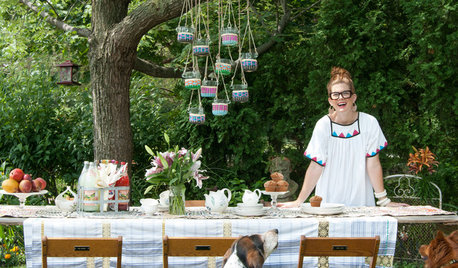Locally grown
annafl
16 years ago
Related Stories

ATTICSRoom of the Day: Cramped Attic Becomes a Grown-Up Retreat
A New Jersey couple renovates to create a new master bedroom in a space once used for storage
Full Story
DECORATING GUIDES9 Dorm Room Classics Schooled in Grown-Up Style
Furniture, shelves and lighting from college years past make for high-grade interiors with a bright future
Full Story
GARDENING AND LANDSCAPINGSee a Family Greenhouse Grown From Scraps
Can-do resourcefulness and less than $400 lead to a new 8- by 8-foot home for plants on a Tennessee family's property
Full Story
BEDROOMS8 Youthful Bedrooms That Show Grown-Ups How It's Done
Be a design wild child well past teendom with ideas for adult bedrooms that walk the line
Full Story
DECORATING GUIDESLocal Color: Tobacco Baskets Pack In Southeastern Style
Made of woven oak strips, these antique baskets bring rustic texture to rooms of all kinds
Full Story
FUN HOUZZLocal Color: Souvenir Birdhouses Flock to Southern Homes
Written instructions come with these charming tiny homes — not for installing but for what to see
Full Story
TRADITIONAL HOMESMy Houzz: A Centuries-Old French Estate Charms Again
Time and local artisans help a couple realize an idyllic French country retreat — and you can rent it
Full Story
HOUSEPLANTS8 Essentials for Healthy Indoor Plants
Houseplants add so much to our homes — and can thrive when grown in the right conditions. Keep these tips in mind
Full Story
ECLECTIC HOMESMy Houzz: Garage Sale Meets Glam in Ohio
With their 5 kids grown up and moved out, a Euclid couple finally gets to design all for themselves
Full Story
KITCHEN OF THE WEEKKitchen of the Week: 27 Years in the Making for New Everything
A smarter floor plan and updated finishes help create an efficient and stylish kitchen for a couple with grown children
Full StoryMore Discussions



laceyvail 6A, WV
duluthinbloomz4
Related Discussions
Locally Grown Oats
Q
locally grown poinsettias in buffalo area?
Q
Favorite Australian summer 'treat' fruit etc. ?
Q
Locally grown artichoke one-year plants?
Q
annebert
laceyvail 6A, WV
islandpete
calliope
skagit_goat_man_
duluthinbloomz4
calliope
mlevie
paulns
aorensthe
aok27502
skagit_goat_man_